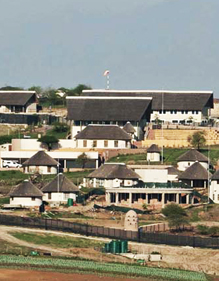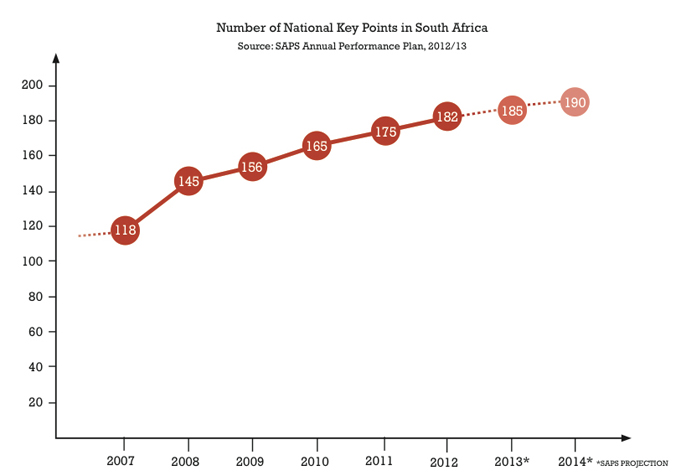|
Getting your Trinity Audio player ready...
|
 In the last five years there has been a 54% increase in the number of “national key points” across the country, says Right2Know in its recently released Secret State of the Nation report.
In the last five years there has been a 54% increase in the number of “national key points” across the country, says Right2Know in its recently released Secret State of the Nation report.
The increase has happened under the National Key Points Act – which has been referred to as an “apartheid-era” national security law. The most famous property to have been classified under this Act recently, has been President Jacob Zuma’s Nkandla residence. Airports, power stations and factories can also be declared National Key Points.
There are currently about 185 national key points in South Africa, but the public remains mostly clueless as to which residences or properties are classified as such.
R2K describes a national key point as a place so important to national security that it needs extra security, extra protection and extra secrecy.
The Act empowers the minister of police, or anyone he or she delegates the power to, to declare any building a national key point. The Act also restricts access to certain kinds of information about these places and prohibits people’s right to assemble or protest there – as well as the taking of photographs, according to R2K.
Since the story broke last year, the Department of Public Works has used the National Key Points Act as a reason for not disclosing the full details of the Nkandla upgrade, estimated to have cost R206-million in taxes.
Today, however, Deputy Minister of Public Works Jeremy Cronin became the first senior government official to publically criticise the Act, calling it outdated and problematic.
Cronin said this in a speech prepared for Parliament in response to Zuma's State of the Nation address on 14 February.
"This Parliament does need to look at this anachronistic and problematic piece of legislation, it may well be unconstitutional," he said.
According to Mail & Guardian, Cronin did not read out his views about the Act while delivering his speech. “These points were part of a prepared speech that was sent out to the media by both his party, the ANC and by the government communication and information system, GCIS,” the publication reported.
Cronin also described the spending at Nkandla as "probably excessive and … undoubtedly extremely costly security operational requirements put in place", according to Mail & Guardian.
The fact that any site can be named a national key point and there being no public access to such information means you could be breaking the law without even knowing it, says R2K.
R2K: How to fix it
- The South African police must release the list of the country’s national key points
- Parliament must take steps to repeal the National Key Points Act







